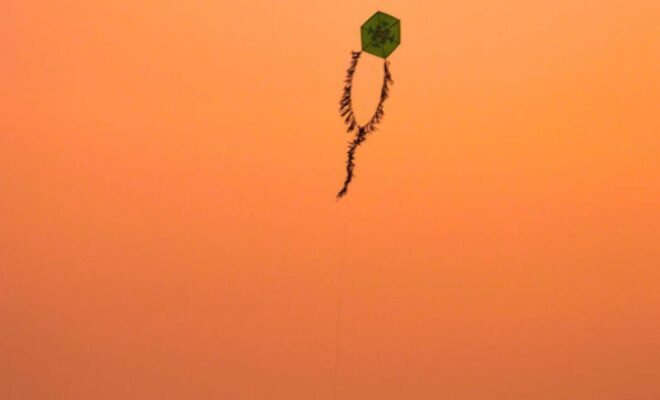Flying Kites and Dogfights – Part 2

- Flying Kites and Dogfights
- Flying Kites and Dogfights – Part 2
Although our home is small, the rooms are sizable and airy, with twelve-foot ceilings. Clerestory windows above doors increase natural light and air circulation. A long open south-facing verandah runs the entire width of the building. Sudhir and I spend most of our mornings and evenings here in the open. Another staircase leads to an exposed rooftop. The panoramic view from here sweeps the entire horizon. Stretching below are radiating streets and surrounding buildings. Low rooftops stretch behind us to the ancient fortified walls of Old Delhi. The minarets of the old Idgah* punctuate the horizon. Westward, the main drag dips and climbs a small hill, Anand Parbat, to catch the setting sun. A wide brick parapet runs its perimeter, making it safe, unlike those behind us. On summer evenings, a medley of young boys, girls, and grown men swarm these rooftops. Airborne kites cruise the skies, colorful streamers fluttering behind in the breeze.
Now and then, a bully shows up egging for a fight. We cannot be too careless watching out for these, but on occasion, we are. One instant, a kite soars high up in the sky, enjoys a different air and altitude, and poses no threat. Without an inkling, it dives in a broad swoop, and the two twines graze. The weakling underneath, caught unawares, severs. Helpless, small pathetic faces close to tears, we watch our kite sail off. Rudderless, it descends on a long slow wayward path in the distance.
Ever optimistic, within moments, we forget our loss and talk about revenge. Daddy shakes his head and chats up defensive kite-flying. Years later, we hear the same words on defensive driving. The sport is for enjoyment. There is so much pleasure in mastering the finer points, climb high, hold steady, dance in wide, even swoops. Developing these skills requires patience and perseverance. Fretting and fuming over the loss of a kite, trying to get even, not worth the energy.
In these early kite-flying summers, Daddy is with us on the rooftop every evening. Not only is he coaching us but also supervising our excitement and keeping it under check. We must stay on the roof and not climb on the balustrade. Kite-flying is a hazardous pastime. Every summer we hear of some young kid, even an adult, falling to his death from unsafe roofs. Losing a foothold here or jumping over a missed parapet, eyes skyward, so easy to miss our footing. The sight of a dangling twine of a severed kite drifting their way, within reach, we misjudge. Other times, we hear of kids running over while chasing kites in the streets, which end up ripped anyway. A schoolmate of Sudhir falls to his death in this manner. A full-page portrait of the nine-year-old appears in the school’s yearbook. For days, Sudhir and I keep opening that page to scan the picture for any sign to predict the boy’s death. Mesmerising words caption the portrait “Whom the Gods Love.”
A few times, while teaching us to maneuver our kites, Daddy gets another one airborne. Sudhir enjoys the competition and edges his kite a tad higher than Daddy’s! Wow! On another day, both Daddy and Sudhir have their kites flying high. Turning to Sudhir, Daddy asks him to hand over twine and control of his kite. Sudhir’s puzzled frown has me confused too. I see Daddy’s lop-sided smile and giggle in anticipation of a new trick. Sudhir hands Daddy his twine.
Daddy is concentrating on two soaring kites, one in each hand. Motions Sudhir to hold and work the two spindles at the same time. This is critical for the twines to have give without getting tangled. Wow! And wow, again! Dumbfounded, Sudhir and I can only look at each other. Daddy can work wonders, but this is way too much to fathom. Sudhir and I watch Daddy in renewed awe! After a few minutes, Daddy hands back Sudhir’s kite, who now clamors to hold both kites.
Can we hold on to two kites and maneuver the two together? Sudhir learns it requires coordinated hand-eye movement in contradicting directions. Daddy stands behind Sudhir, guiding his hands and showing him how to keep an eye on both kites at the same time. Sudhir asks Daddy how long it took him to learn this special skill.
Laughing, Daddy tells him, “A very long time!”
It’s a hot summer evening, and dinner is over. Daddy is lying outside on the pillowed cool sheets of his charpoy. He murmurs Urdu stanzas, even as his eyes scan the deepening blue of the sky. Stars are starting to prick through. Daddy calls us and points up to something. Sudhir and I follow Daddy’s line of sight and see a faint speck of light in the sky. It appears to be some far-away star, but then Sudhir notices it moving! Could this be the light of a far-off airplane? But then the point of light starts bobbing!
Daddy keeps us guessing. We rack our brains with wild guesses. Is it a UFO, or has America launch a satellite (the news always saying it is on the brink of conquering space)? No! Well, it must be a Russian sputnik!
After a maddening long time, Daddy solves the riddle. It is a kite flying in the dark, with a paper lantern and a lit candle, a “kandeel!” The lantern hangs from its twine several feet from the kite! What? Stunned! Mind-boggling! Kite-flying at night, in the dark, we cannot even see the kite! How would we know if it was holding steady or dipping to one side or the other? How would we exercise control and know which way to yank the twine? So much depends on keeping an eye on the kite. Daddy smiles and gives us one of his “you will see” looks.
The next evening after a hurried early dinner, we all troop up to the rooftop. A couple of candles light our purpose. Mummy has dug up one of those tiny folding paper lanterns we string up at Diwali. Daddy unwinds some length of twine and secures the lantern to it. A small burning candle waxed to its small, silvered base. Paper sides pulled up to shield it from the wind. We are ready!
Daddy stands at one end of the roof, twine in hand. At the other end, Sudhir is ready. Arms outstretched, poised to launch the kite. Daddy gives the word, and Sudhir lets go of the kite with an upward jump to push the kite higher. Daddy gives a few expert yanks to the taut twine, and the kite ascends! Higher and higher it goes. It looks like a ghost, indiscernible in the fast, fading evening. In a few moments, the kite vanished in the dark, the twine in Daddy’s hand the only sign it is up there somewhere. Daddy shows us the feel of the slipping twine and how to judge the kite’s behavior from that feel.
A couple of minutes later, we reach the point in the twine where the paper lantern is hanging from it. Daddy feeds more twine a little at a time till the lantern is aloft. We see it climbing, receding from us ever so slowly. By turn, Daddy lets Sudhir and me hold the twine to get a good feel of the kite’s behavior and how to maneuver it. It is an astonishing experience!
We indulge in this night-time flying only a few times. It has its thrills, and Sudhir enjoys describing it to our cousins and his friends. The rooftop is not lit. It is too dark, and the supervision is extra strict. There is also an element of boredom about the whole notion of kite flying at night, which Sudhir and I do not voice! The fun of sharing and showing off to others on rooftops is missing. Loud exchanges and laughter. Exciting dogfights, the thrill of certain victory, and utter disappointment of defeat and loss. None of this is there.
Sudhir and I conclude this is a great show-off experience. Still, it is not something we enjoy, and neither of us cares for the extra control. We are not sad about not flying kites at night, kandeel, and all. Too much bother, not enough fun!
Our summer fun, as always, is less important than our studies! On school days, we dare not step on the rooftop until all the homework due the next day is complete. It is getting warmer, the mid-year exams are over, and school is getting ready to close for the summer. Sudhir and I are looking forward to sleeping late and having no school homework.
And there is Daddy’s summer rule. We have to study during the holidays. Every evening Daddy assigns both of us homework for the next day. Daddy reminds us we have to exercise to keep our minds sharp. How? By doing arithmetic problems and English reading/writing assignments every day. Sudhir and I hate this with a passion, but who can argue with Daddy?
“Get these tasks done and out of the way in the morning when your minds are fresh, and then enjoy the rest of the day.” Mummy repeats these words every day. But Mummy does not understand. We’d rather enjoy the cool of the morning playing outside and hitting the books when we must be indoors. I prefer this approach and manage to snooze my way through the assigned work. Not so Sudhir! He is always too tired to open the books. He neglects the tasks or does a slipshod job. Daddy’s patience is wearing thin, but he does not believe in threats, only consequences. He’d rather impress upon us our goals in life and develop a love for learning. Become good contributing members of society, like doctors or engineers.
I know Daddy is losing his cool and lays out some penalties. No kite-flying if the assignments are not done. Does not work. Sudhir reverts to playing with his marbles and other toys. One day Daddy returns a little earlier from work, and Sudhir is up on the roof flying his kite in the hot sun. Oh! Oh! Big-time trouble ahead! Kite-flying without adult supervision and homework not done. Whoa! Sudhir is in big trouble. Daddy takes him aside for a good talking to. The outcome is a threat of punishment. If tomorrow’s tasks remain undone, Daddy will destroy all the kites. And Daddy is very stern about it, and Sudhir knows it is not an empty threat.
The next day, Mummy is after Sudhir’s to sit down to his tasks. Sudhir says, in a minute, but that minute never comes. Morning turns into afternoon and afternoon into evening with the books unopened. Sudhir’s mood gets more sullen as the day progresses, and by evening he is almost ready to cry. Daddy is home and, after a bit of rest, takes a look at our homework.
I am fine, but a morose-looking Sudhir goes to the guest bed, picks up all his kites, and brings these to Daddy. Eyes downcast, on the verge of tears, he apologizes for not doing the homework. And he hands the kites over to Daddy. Daddy looks at Sudhir, and I watch him swallow hard. I turn away but cannot—I am frozen.
After a few moments, Daddy asks, “Why should I not tare up all these kites?”
Sudhir looks up at Daddy, incredulous at a chance to save his kites. He stutters a promise to do all the homework, starting right away. Daddy asks if it is a serious promise. Sudhir nods. Daddy smiles, and tears spill down Sudhir’s sun-kissed, still-chubby cheeks.
Sudhir does keep his promise, sort of, for the rest of summer. The Monsoons arrive in drenching sheets, and schools reopen. The kite-flying season ends for the year, a memorable year when we learned the fine art of kite-flying.
* A place for Moslems to gather and read Namaz.









